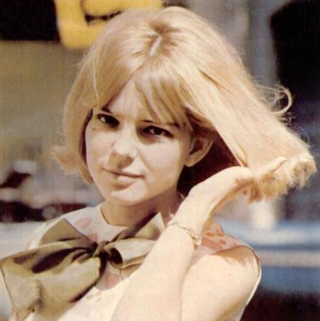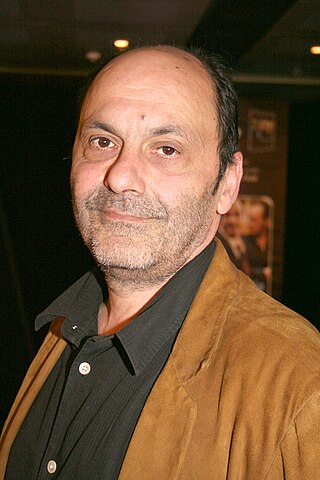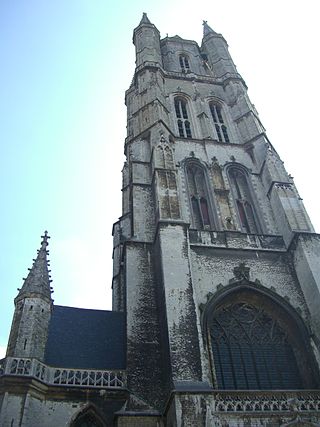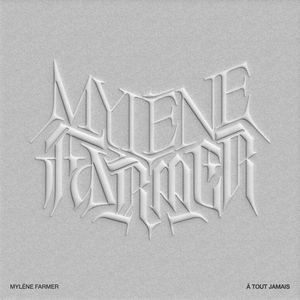
Johannes Ockeghem was a Franco-Flemish composer and singer of early Renaissance music. Ockeghem was the most influential European composer in the period between Guillaume Du Fay and Josquin des Prez, and he was—with his colleague Antoine Busnois—the leading European composer in the second half of the 15th century. He was an important proponent of the early Franco-Flemish School.

Isabelle Geneviève Marie Anne Gall, known professionally as France Gall, was a French yé-yé singer.

Gilles Vigneault is a Canadian poet, publisher, singer-songwriter, and Quebec nationalist and sovereigntist. Two of his songs are considered by many to be Quebec's unofficial anthems: "Mon pays" and "Gens du pays", and his line Mon pays ce n'est pas un pays, c'est l'hiver became a proverb in Quebec. Vigneault is a Grand Officer of the National Order of Quebec, Knight of the Legion of Honour, and Officer of the Ordre des Arts et des Lettres.
Clément Janequin was a French composer of the Renaissance. He was one of the most famous composers of popular chansons of the entire Renaissance, and along with Claudin de Sermisy, was hugely influential in the development of the Parisian chanson, especially the programmatic type. The wide spread of his fame was made possible by the concurrent development of music printing.
Gilles Marchal, born Gilles Pastre, was a French songwriter and singer who reached the height of his career during the 1970s.
Matthaeus Pipelare was a Netherlandish composer, choir director, and possibly wind instrument player of the Renaissance.

Jean-Pierre Bacri was a French actor and screenwriter.

Martine St. Clair is a Canadian singer from the province of Quebec. She has released numerous albums in a career that has spanned over two decades.

Adieu mes amours was a popular secular polyphonic chanson of the late 15th century. Many settings of this tune are in fact based on the c. 1480 setting by Josquin des Prez, in which the lower two voices are in quasi-canon, and the upper two voices are freer. The tune itself is in a simple ABA' form. It appeared in many manuscripts and prints from many countries, including in Ottaviano Petrucci's Odhecaton A.

Fors seulement is a French chanson, popular as a basis for variations and as a cantus firmus. An early version, attributed to Johannes Ockeghem, is sometimes called Fors seulement l'attente to distinguish it from his similarly titled Fors seulement contre.

Didier René Henri Barbelivien is a French author, lyricist, songwriter and singer. Beginning in the 1970s, he wrote a number of successful songs for artists such as: Dalida, Johnny Hallyday, Michel Sardou, Daniel Guichard, Claude François, Gilbert Montagné, Sylvie Vartan, Patti Layne, Gilbert Bécaud, Enrico Macias, Demis Roussos, Mireille Mathieu, Hervé Vilard, Michèle Torr, C. Jérôme, Christophe, Julio Iglesias, Sheila, Nicole Croisille, Patricia Kaas, Éric Charden, Jean-Pierre François, Michel Delpech, Philippe Lavil, Elsa, Gérard Lenorman, Ringo, Garou, Corynne Charby, David and Jonathan, and Caroline Legrand among others.

Jheronimus Vinders was a Franco-Flemish composer of the Renaissance, active at Ghent. He was a minor member of the generation after Josquin des Prez, and he also composed a notable lament on the more famous composer's death.

St. Jean Baptiste 2010 is a French language digital compilation by Canadian grindcore band Fuck the Facts. It is in celebration of the national holiday in Quebec.
Henri Betti, born Ange Betti, was a French composer and a pianist.

Renaud Hantson is a French singer, musician, drummer, actor and writer. Besides his solo career, he has been part of hard rock and rock bands like Satan Jokers and Furious Zoo.

La Vie moderne: intégrale 1944-1959 is a 14-CD box set compilation of Léo Ferré studio and live albums recorded for Le Chant du Monde and Odeon Records between 1950 and 1958. The box set brings together for the first time nine historical albums, several 78s and 45s cuts, rarities and unreleased radio archives, with many alternative versions. Lyrics are not included. This is the first box set of a complete collection of works recorded by the artist.

"À tout jamais" is a song recorded by French singer Mylène Farmer for her twelfth studio album, L'Emprise. The song was written by Farmer in collaboration with French musician Woodkid.














